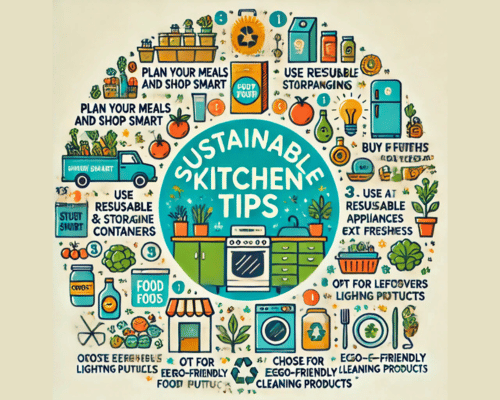Sustainability has become a vital part of daily life, and the kitchen is one of the best places to start making meaningful changes. Small adjustments in how we manage food, energy, and waste can significantly reduce our environmental footprint and even lower household expenses. With rising concerns over food waste, plastic pollution, and energy consumption, it’s more important than ever to adopt eco-friendly practices in our homes. This article will share 10 essential tips that not only make your Sustainable Kitchen Tips but also help you save money in the process that proves going green benefits both the planet and your wallet.

Plan Your Meals and Shop Smart
Meal planning is a simple yet effective way to reduce food waste by ensuring that you only buy what you need for the week ahead. By mapping out your meals, you can avoid overbuying perishable items that may spoil before use. This not only minimizes waste but also saves time in the kitchen by having a clear plan.
- Actionable Steps: Start by creating a weekly menu and sticking to a grocery list when shopping. Utilize meal prep apps like Paprika or Yummly to organize recipes and track ingredients.
- Money-Saving Benefit: Fewer impulse purchases and less wasted food lead to significant savings on your grocery bill.
Buy in Bulk and Minimize Packaging
Purchasing food items in bulk is a great way to reduce the amount of plastic waste that comes from single-use packaging. Instead of buying individually packaged goods, buying in larger quantities helps decrease the reliance on plastic and other disposable materials, making your kitchen more sustainable.
- Actionable Steps: Bring your reusable containers or bags to bulk food stores where you can buy dry goods like grains, nuts, and spices without the excess packaging. Many stores also offer refill stations for pantry staples.
- Money-Saving Benefit: Bulk purchases are often cheaper per unit than smaller, pre-packaged portions, helping you save money while reducing waste.
Use Reusable Storage Containers
Single-use plastics, such as disposable bags and wraps, contribute significantly to environmental pollution. These items take hundreds of years to break down, adding to landfills and harming ecosystems. Switching to reusable storage containers made from glass, silicone, or stainless steel is a simple way to reduce plastic waste in your kitchen while preserving food longer.
- Actionable Steps: Use glass or silicone containers for storing leftovers, and opt for reusable beeswax wraps or silicone bags instead of plastic wrap. These alternatives are durable and environmentally friendly.
- Money-Saving Benefit: A one-time investment in high-quality containers eliminates the need for frequently buying plastic bags or wraps, saving you money in the long run.
Compost Food Scraps
Composting is an effective way to reduce the amount of food waste that ends up in landfills, where it contributes to greenhouse gas emissions. By composting, you can turn food scraps and organic waste into nutrient-rich soil, which is ideal for gardening and landscaping. This eco-friendly practice not only minimizes waste but also enhances the health of your garden.
- Actionable Steps: Set up a compost bin in your backyard or even indoors with a small, odor-resistant container. You can compost fruit and vegetable scraps, coffee grounds, eggshells, and more.
- Money-Saving Benefit: Homemade compost acts as a natural fertilizer, saving you money on store-bought fertilizers while boosting plant growth.
Cook with Energy-Efficient Appliances
Using energy-efficient appliances and cooking methods can significantly reduce your kitchen’s energy consumption, making your home more sustainable. Appliances like induction stoves, slow cookers, and convection ovens use less energy while still cooking meals effectively. These small changes help lower your carbon footprint and conserve resources.
- Actionable Steps: Consider upgrading to energy-efficient appliances such as induction cooktops or air fryers, and make use of slow cookers for low-energy, long-duration meals. Additionally, always use lids on pots to trap heat and speed up cooking.
- Money-Saving Benefit: With reduced electricity or gas usage, energy-efficient appliances lead to lower utility bills over time, offering long-term savings.
Store Food Properly to Extend Freshness
Storing food properly is key to preventing spoilage, reducing waste, and making your groceries last longer. By using the right techniques, you can extend the freshness of fruits, vegetables, and other perishables, keeping them at their best for longer and reducing the need for frequent restocking.
- Actionable Steps: Refrigerate perishable items at the correct temperature, freeze fruits and vegetables for long-term storage, and consider canning seasonal produce. Store foods in airtight containers to preserve their quality and freshness.
- Money-Saving Benefit: With less food spoiling, you’ll reduce waste and make fewer trips to the store, saving money on groceries and cutting down on food waste.
Use Leftovers Creatively
Transforming leftovers into new meals is a great way to minimize food waste while saving both time and money. By creatively repurposing what’s left in the fridge, you can reduce the need for frequent grocery trips and make the most of every ingredient.
- Actionable Steps: Turn leftover vegetables into stir-fries, soups, or frittatas. Use cooked meats in sandwiches, salads, or tacos. You can also reinvent leftover rice into fried rice or rice pudding. Be open to experimenting with combinations.
- Money-Saving Benefit: By maximizing the use of what you already have, you cut down on the cost of buying new ingredients, reducing the need to cook from scratch for every meal.
Opt for Energy-Saving Light Bulbs and Fixtures
Switching to energy-efficient lighting, such as LED bulbs, can make a significant difference in your kitchen’s energy use. LED bulbs consume much less power than traditional incandescent bulbs and last far longer, making them both eco-friendly and cost-effective.
- Actionable Steps: Replace old light bulbs with LED alternatives and consider installing dimmer switches to control brightness and reduce energy use when full lighting isn’t needed. Motion sensor lights are another easy upgrade for energy conservation.
- Money-Saving Benefit: With lower energy consumption, you’ll see a reduction in electricity bills, and the longer lifespan of LED bulbs means fewer replacements, saving you money over time.
Grow Herbs and Vegetables
Growing your own herbs and vegetables is a sustainable way to reduce transportation-related emissions and packaging waste from store-bought produce. It also gives you access to fresh, organic ingredients right at your fingertips, promoting a healthier and greener lifestyle.
- Actionable Steps: Start a small kitchen garden by planting easy-to-grow herbs like basil, mint, or parsley in pots on a windowsill. For those with outdoor space, try growing vegetables like tomatoes or lettuce in raised beds or containers. Even small spaces can accommodate vertical gardens or hanging planters.
- Money-Saving Benefit: Growing your own produce eliminates the need to buy expensive herbs and vegetables, helping you save money on groceries throughout the year.
Choose Eco-Friendly Cleaning Products
Conventional kitchen cleaners often contain harmful chemicals and are packaged in single-use plastic, contributing to pollution and waste. Switching to eco-friendly cleaning products benefits the environment and makes your home healthier and safer.
Actionable Steps: Opt for natural alternatives like vinegar and baking soda, which can be used for a variety of cleaning tasks, from scrubbing countertops to deodorizing drains. Mixing essential oils with water can also make your DIY cleaning solutions. Use reusable cloths or sponges instead of disposable paper towels.
Money-Saving Benefit: Homemade cleaners are more affordable than store-bought options, and reusable cloths further cut down on costs, reducing the need to buy cleaning supplies frequently.
In conclusion, we can say that small, Sustainable Kitchen Tips like meal planning, using reusable containers, and growing your herbs can have a big impact on both the environment and your budget. By following these simple tips, you’ll reduce waste, save money, and contribute to a greener future. Start by implementing just one or two of these ideas today and see the difference it makes! Have your eco-friendly kitchen tips? Share them in the comments or feel free to ask any questions!

Hey There, I’m Monica, Mom of two. This is my personal blog site. Here I write about Kitchen Tips Tricks, Recipes, and Review the products I use.
I hope you enjoy the article. Give me feedback on how I’m doing with my blog. I would appreciate it so much.
Have a great day! 🙂
[Follow me on Twitter]


